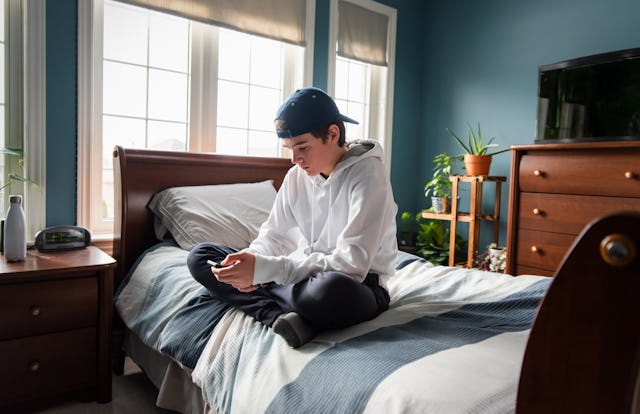Texting Your Teen To Get Them To Open Up Works, Trust Me
I can’t lie — this was frustrating for me to discover.

A few weeks ago I got a call from my daughter’s high school counselor. She let me know she’d been coming to see her a lot more lately and that today was an especially hard day.
“I just dropped her off at school, she seemed happy and didn’t say anything,” I said right away.
“Well, she’s been coming to see me quite a bit lately and today she was crying. I strongly recommend looking for some therapy for her if you haven’t already.”
The conversation went on and she was able to give me more specifics without breaking my daughter’s trust. I have to admit it took me a minute to catch up with what was happening. My daughter and I are very close. I know she’s struggled with her mental health in the past but lately, she seemed good. Like, really good. She’s been motivated, getting all her work done, and laughing and smiling more than I’d seen for a long time.
When she got home from school she was quiet. After we got settled and her brothers were doing their after-school routine, I went up to her room to talk to her. I knew it would be a stretch because my daughter has always had trouble talking about herself and her feelings. If I pushed her too hard she would shut down completely and it would become even harder for her to express herself.
I let her know I had a few calls to therapists and told her how much I loved her and I was always here. I asked her a few times if she could tell me what was bothering her or if there was anything I could do. After spending a half an hour with her and not getting much information, I decided to give her some time alone.
But then I decided to try something: I sent her a text. I asked her the same questions I had asked her when I was upstairs with her in her room. But now I got answers. She was able to tell me what had been bothering her and what I could do. I instantly felt better and I could tell by the way she bounced down the stairs a few minutes later she did too.
This also happened with my older son several times over the years. He’s gone through a breakup, struggled in school, and went through several stages where he seemed overly angry and his temper made me nervous. All three of these experiences led me to try anything to get him to talk. I’d try talking to him and I would hardly get answers. But one day while he was in a really bad way, I sent him a text and we were able to have a conversation about his behavior.
We were texting for about a half an hour and it opened the communication barrier we’d been having. Then, I could tell he instantly felt better and that led to better in-person conversations.
I can’t lie — this was frustrating for me to discover. I want my teens to be able to communicate with me in person and not solely rely on their phones or texting when it comes to having a talk. But for my family, texting gets difficult conversations moving in the right direction every single time.
I didn’t grow up with a phone at my fingertips, but there were many times I wrote my parents or friends letters when something was on my mind or I was struggling with something. It really helped me learn it was okay to express myself. Our kids’ phones work in the same way. It’s a lot easier to talk about how you are feeling through text than it is face to face, and I’ve decided that just because it’s not my favorite way to communicate kids doesn't mean it’s not useful.
The way I see it, any form of communication with your teens is a big deal and we should pay attention to all of it. If a few texts are all they can muster but it allows us to get some answers, that’s good enough for me.
Diana Park is a writer who finds solitude in a good book, the ocean, and eating fast food with her kids.
This article was originally published on